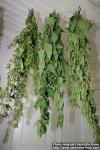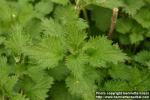Latin: Urtica dioica and other more gentle Urtica species (there are some that sting so much that they're outright toxic, in the tropics and possibly subtropics.)
Family: Urticaceae, nettle family.
Parts used: Young growth, tops, leaf; seed; root.
Taste: Nutritious. I don't recommend eating it without first taking care of the sting, one way or another.
4 humors: Dryish, Cold (I think).
Actions:
- Nutritious.
- Great for allergies.
- Excellent iron source; also good for oxygen uptake.
- Will help the joints.
- So much fiber that it's good for gut problems as well.
- The seeds are excellent for burnout and similar adrenal deficiency problems.
- The root is good for the prostate, but I haven't used it much.
Food uses:
- So don't make a salad, unless you give the leaf or young tops or young shoots a twirl in your blender or suchlike first. I've been there, done that, got the T.
- For boiled greens ("spinach" type things), it's best to mince the greens as much as possible, after they're boiled. I find the texture to be a tad harsh, otherwise. (That's one reason this isn't grown in vegetable gardens. The other is that it stings, but that shouldn't be impossible to overcome; there are, after all, varieties with next to no stings.)
- For a herbal tea, use dried or fresh. Mmmm. Nettle chai. Or Nettle latte, if you prefer.
Notes:
- Stinging nettle stings. The sting isn't dangerous, and the red skin + itch will subside within about half an hour ... there's really no need to find the nearest ER and rush over there, just cos a nettle stung you. (This really was what one or the other USA:ian did, and told world+dog he/she did, on one or the other herb list. Sigh.)
- Don't pick overly old nettles; they make calcium carbonate crystals which can irritate the kidneys. (I don't bother to remove clean green leaf from my nettle seed stalks though: that's fairly recent leaf, it's at the top of the stalk.)
- Don't pick it where fecal bacteria thrive: behind the stables, next to the outdoor loo, or beside the fence of the sheep, horse, cow or similar pasture.
- You can pick stinging nettles off the compost heap, or from the pasture if it hasn't been in use for the last year or so; but if you do, wait for three sunny days to minimize the nitrate content.
- There's nitrates. There's nitrates in spinach, too. Spinach is the first real food they give to babies in France ... I do think the nitrate is bad for babies caution might be a tad overblown. But ... don't give nettles to babies.
Experiences:
- Nettle tea (or nettles in any form really) is great for hayfever.
- I do add nettles to client's tea blends for all kinds of run-down problems as well.
- And as nettles are widely recognized as a wild food, over here, I tell clients to pick their own, for food ... after all, it's everywhere, around here. (Nettles are also available in pretty much all health food stores, as tea.)
- The sting is good for joint aches. Whip the ankle or whatnot with some fresh nettles and wince, but sigh in relief once that sting abates: it works! Oh wonder. (They use wasps and bees in similar ways.)
- Nettle is diuretic; humorally, that means it's dry. Add mucilaginous herbs (like mallows) in dry climates (the desert), or dry parts of the year (below-freezing winters).
- The seed is astonishing for people who would, but just don't have the energy. If a client says "I'm too tired to" at least three times during our talk, they get nettle seed.
- A pinch of seed is enough for sensitive people; more robust folk get a teaspoon a day.
Comments on Facebook:
http://www.facebook.com/note.php?note_id=356127661065338
- From Sara Hamer:
totally agree about nettle tea being good for hayfever. And nettle makes a good "base note" for blended teas. Taken regularly internally it's pretty good for arthriticky joints, so you don't have to be brave and whack yourself with them!
25 January at 22:52 - From Mala B.:
A lot of people say that when harvesting nettle, if you grasp firmly it won't sting you. They may be right, I just wear my thickest rubber gloves.
25 January at 14:21 - From Mala B.:
I used to man herbal helpline. One of my best calls was from a man asking how long to boil nettles to make beer. He claimed that not only did his home-made nettle beer make his hair grow back, it grew back the right colour (no more grey)!
25 January at 14:23 - From Henriette's herbal:
Mala: heh yes, perhaps they have less stingy nettles?
The beer making the hair grow is spot-on, forget to mention that nettles, in any form, externally or internally used, will do that :-)
25 January at 14:47 - From Weasel Bear:
Nettle everything! Put it in the soup,put it in the salsa...group it with other brothers and dint forget the pasta...
25 January at 17:45 - From Nelle Rose:
dry for including in chicken food, both mash and pellets
26 January at 23:19
Comments on the herblist:
http://lists.ibiblio.org/mailman/listinfo/herb
From Rebekka E.
Date: 2012 01 26 - 11:22:15 +0200i lovelove nettle, she is so versatile! nourishing and tonifying or draining and releasing that junk if need be.
i give it as a nourishing infusion (a handfullish of herb per liter water, steeped for min.4 hours) to weak, anemic, menopausal, wanting to get preggers etc people. works a treat.
those ppl who lost their drive (gave up) get the seeds.
those with allergies tincture.
if diuretic and antirheumatic properties are wanted, i give the tea.i love it in the garden too, it seems to sting only "nasty" people :+)
leftover tea can be give to the plants, wonderful fertilizer
or as a stregthening hair rinse.. etcetc..From Rowena
Date: 2012 01 26 - 14:43:26 +0200My mother, and my grandmother before her, used to cut the tender tops off young spring nettles, chop, and add to beaten egg to make a nettle omelette. Very good.
In Wales at one time, there was a great crop of nettles the other side of a stone wall along the edge of the property where I lived.. I had a use for them, cut them, and spread them on top of the stone wall to dry. I happened to look out of the window the next day, and was amazed to see a herd of cattle that never used to come to my corner of the pasture all shoving each other to get at them. I mentioned it to my aunt, and she said cattle would go wild for cut nettles, and that the men at home on the farm would sometimes cut nettles to give the animals a treat.
Local wisdom was to rub nettle stings with dock leaves for relief.
Nettle wine is another way of utilising them. Plenty of recipes on the net.
I wanted to get rid of that huge patch of nettles that looked so bad the other side of the stone wall, growing so tall and looking so neglected. I learned that to get rid of nettles you had to clear the patch for three years in a row. I started, but then came back to Australia. They grow in some places; one is Pemberton in Western Australia.
From jim mcdonald.
Date: 2012 01 26 - 18:29:18 +0200I like fresh nettle leaf/stem tincture for people stuck in sympathetic excess states - they're always on alert, and the sympathetic nervous system dominance has metabolic, immune and other more parasympathetic related functions inhibited. Anemone works in the moment like a charm, but nettle tincture long term does wonders.
and (because people always ask): not ~instead~ of nettle teas/infusions, but along ~with~ nettle teas/infusions.
This is a few years old now (and so, to me, dated), but I don't think I've got links to it anywhere on my site: Nettles, oats and you
From Jules W.
Date: 2012 01 26 - 18:43:41 +0200>* The root is good for the prostate, but I haven't used it much.
Its wet but warmish for winter here in my part of the UK right now. This morning I decided to clear half our chicken patch of nettles because I am planning to re-sow grass, purslane etc this spring in the hope that it might provide heaven for the chickens and delicious eggs for us. So I have wheelbarrows full of lovely yellow nettle root. Of course it is full of soil and some is currently soaking in a bucket outside the back door for some herbal kitchen alchemy later on. Can anyone tell me how best to convert it into good medicine that will last more than a few months? Someone suggested a deep decoction… what do you think?
Has anyone got any stories about using nettle root particularly?
Would be really interested to hear more.
From Henriette Kress
Date: 2012 01 26 - 19:31:24 +0200> So I have wheelbarrows full of lovely yellow nettle root.
Wash it (it's fairly easy to get rid of most of the dirt), slice thicker roots, remove all eaten parts and the larvae that come with that damage, hang up to dry somewhere out of the sun and damp.
(Hard yellow beetle larvae love to burrow in nettle roots ... perhaps it's also good for their prostate?)
When the root is dry (it doesn't bend anymore, but breaks), snap (or hammer) to pieces (1-3 cm or ½ - 1") and store in jars for later use.
This will keep for a few years. Decoction, sure, deep decoction sounds better. Capsules work as well, but for that you'll have to powder the dried root. I expect a honey paste would do instead of capsules ...
A fresh root tincture works too, of course.
From kimberlee h.
Date: 2012 01 30 - 02:33:53 +0200 In that pic of the dried stalks with the seeds on them, would you consider those nettle leaves too old? Did you use them or do you only use young, top leaves?
In that pic of the dried stalks with the seeds on them, would you consider those nettle leaves too old? Did you use them or do you only use young, top leaves?From Henriette Kress
Date: 2012 01 30 - 09:54:36 +0200I've removed black, dirty and/or diseased leaf either in the field or before hanging them to dry; whatever leaf there is left on the stalks will get rubbed into the "nettle seed" once it's all dry. Through a sieve, to catch the seed strings, any stray snail shells, and suchlike ... and to break the stinging hairs.
From Cathy Smith
Date: 2012 01 26 - 19:52:06 +0200I make sauerkraut professionally in Oregon, and today I uncrocked a first test batch of Nettle Sauerkraut.
I have more work to do before I add this variety to my offerings, but I have to tell you that I'm smitten with it. The minerally richness of the nettle works so nicely with the crunchy, sweet green cabbage. The "salty" flavor of the nettle fits seamlessly into the sour-salty kraut. I just want to eat a mountain of it.
If you make sauerkraut, give it a try sometime this spring!
I will use fresh nettles in the next batch of sauerkraut because they will be available.
For this experiment, I used dried nettles from Mountain Rose Herbs, and I put them in with the fresh cabbage and let them ferment together. Gotta try it... the combination is sublime.
Please add your own experiences etc. in the comments!
Nettle is in my book, Practical Herbs; the entry there is a tad different, though, with thorough recipes and so on.
Also see Nettle seed - Nettle latte - Nettle greens - Nettle tea - Old nettles - Picking nettle seed.


